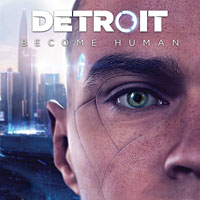A Way Out and Detroit Devs: Twitch and YouTube Do Help Sell Games
David Cage of Quantic Dream and Josef Fares of Hazelight Studios noticed that streams and gameplays showing complete playthrough of Detroit: Become Human and A Way Out actually helped them sell more copies. Players are looking for unique experiences.
There is a large segment of video games that put storytelling above gameplay. Malicious people claim that this type of productions, often referred to as "cinematic", can be easily watched on YouTube or Twitch without spending a penny. Theoretically, therefore, streams and gameplays showing complete playthroughs of such titles should have a negative impact on their sales. As David Cage from the Quantic Dream studio revealed at the Gamelab event in Barcelona, initially it really was like that. However, the situation has changed and nowadays videos presenting the complete playthroughs are driving the interest rather than weaken it.

What is the reason for such a drastic increase? According to Cage, Quantic Dream learned from the mistakes of the past. Early on the moral choices in the games of this studio were quite obvious. When the alternative option is chosen by only 10% of the recipients, for example, then there is a problem. Therefore, the French are now aiming to create dilemmas that divide the community by at least 70/30 (the ideal situation would be 50/50). It is also important that the game takes different paths depending on what decision we make at the moment, which would create a unique experience for everyone. According to Cage, they've done in the case of Detroit: Become Human. To quote his words (via GamesIndustry.biz):
"We can never count exactly how many endings there were to Detroit. It was not about the endings; it was about having a different path, leading to different endings," he said. "The journey itself is different, and different characters can be present, or be dead, or make different moral choices and be in different situations by the end.
(…)
What we realised is the very positive impact this had on the community, and on the sales of the game," Cage continued. "In the past, YouTubers were very problematic for us, because players were watching those videos thinking, 'Okay, I've got the story, I don't need to play the game, I know what it's about.'.
With Detroit, the opposite happened. They were showing one walkthrough, but they couldn't show all of the things that happened in all of the branches. Players watching thought, 'I wish he'd done this'... Suddenly they became our allies, and they helped us to promote the game."
Josef Fares of Hazelight Studios, also present at Gamelab in Barcelona, agreed with Cage. The Swede admitted that he had a lot of concerns when he saw the popularity of A Way Out among streamers.
"I remember when it came out, and A Way Out -- which was still an indie title -- was the number one game on Twitch. I thought, 'Oh shit, we're fu**ed.' But then it sold really well, because people saw it and wanted to play it. In A Way Out's case, it was because they wanted to experience it with someone who hadn't seen it on Twitch."

It will certainly be interesting to observe the further evolution of cinematic games. Perhaps one day we will come to the point where the web of story threads will be so intricately woven that in fact each approach to a given production will be radically different from the previous one. One thing is certain, however, and neither Fares nor Cage intend to give in too much to the pressure of the fans when preparing their next titles. To quote the words of the first one:
"I love my players, but they should also respect me and trust me and the vision I'm trying to create. From a story perspective, I think it's important to have a clear vision and goal, and stick with it and trust it."
Cage added:
"I think if you want to be a creative person in this industry, you have to think about what people will like four years from now -- not what they liked last year. It is about taking risks, it is about going where people maybe don't want you to go. Maybe they don't believe in what you're doing, and that's fine -- because I'm willing to take the risk."
0

Author: Milosz Szubert
A film expert by education. Has been working at Gamepressure.com since January 2017. A fan of tennis, basketball, comics, good books, history, and strategic games by Paradox. Recently a self-taught Game Master (apparently he's quite good at it). For several years, he edited films on the Notatnik Kinomana channel on YouTube.
Latest News
- End of remote work and 60 hours a week. Demo of Naughty Dog's new game was born amid a crunch atmosphere
- She's the new Lara Croft, but she still lives in fear. Trauma after Perfect Dark changed the actress' approach to the industry
- „A lot has become lost in translation.” Swen Vincke suggests that the scandal surrounding Divinity is a big misunderstanding
- Stuck in development limbo for years, ARK 2 is now planned for 2028
- Few people know about it, but it's an RPG mixing Dark Souls and NieR that has received excellent reviews on Steam, and its first DLC will be released soon


